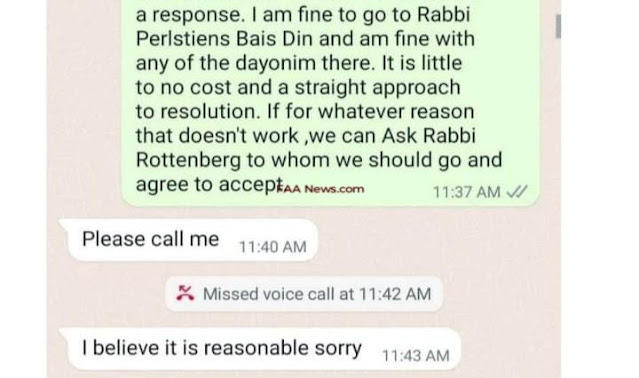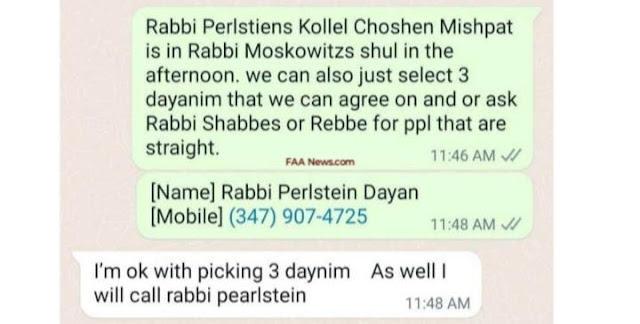Parties to a property ownership dispute discussed via WhatsApp adjudicating their claims in Bais Din.
Specifically, one party messaged, "l'm ok with picking 3 daynim[.] As well I will call [R]abbi [P]earlstein." Subsequently he messaged, "hi so I am ok with [R]abbi [P]earlstein bais din let me know when where we sign that we are going to use this bais din."
In a very impressive ruling, a New York Supreme Court judge has now ruled that these messages "clearly and unequivocally establishes their intent to resolve their dispute through arbitration," relinquishing their rights to go to court.
In making this ruling, the judge ignored testimony from Rabbi Zalman Graus - a Toein and Dayan for 50 years - that there is no actual binding agreement to arbitrate unless the parties sign a shtar beirurim and make a kinyan.
The parties in this story - who have been friends for over 10 years - will be identified here as Petitioner and Respondent. Both parties live in the Monsey area. They are in a dispute related to the proceeds over the sale of a building located in Wilmington, Delaware.
Back in November 2022, Respondent reached out to Petitioner and asked him to agree to adjudicate their dispute in Bais Din.
At one point, Respondent messaged, "I am fine to go to Rabbi Perlstien[‘]s Bais Din and am fine with any of the dayonim there," to which Petitioner responded, “I believe it is reasonable."
Subsequently, Respondent told Petitioner to call Rabbi Perlstien.
Shortly after speaking with Rabbi Perlstein, Petitioner messaged Respondent, “Hi so I am ok with rabbi pearlstein bais din let me know when where we sign that we are going to use this bais din."
The parties then engaged in setting up a time to go down to Rabbi Perlstein’s beis din, Beis Din Choshen Mishpat for that Sunday and Monday.
However, afterwards, Petitioner did not show up in Bais Din, giving the excuse that "his Toen, Rabbi Simcha Roth, was not comfortable in a litvishe bais din."
Respondent then sent him a formal hazmanah to come to Bais Din.
In response, in January 2023, Petitioner, represented by New York Attorney Franklyn H. Snitow, Esq. filed in court a petition to stay arbitration.
In his petition he asserted that the parties simply "discussed whether it would be appropriate to have the dispute determined through a rabbinical arbitration," however, "at no time did the parties enter into a written agreement to refer the dispute to Beis Din Choshen Mishpat led by Rabbi Perlstein."
As part of his petition, he submitted a certification from Rabbi Zalman Graus - a Toein and Dayan for 50 years - that a rabbinic arbitration panel obtains authority to adjudicate only when the parties: (a) execute a Shtar Berurin (an agreement to arbitrate) which specifically identifies the arbitrator(s) that the parties have agreed will hear and rule on a dispute; and (b) perform a kinyan, which is an act symbolizing consideration for the agreement to arbitrate.
In this case, during their communications, the parties discussed signing a Shtar Berurin but never signed one.
The petition additionally asserted that Article 75 of the CPLR, which enforces a written agreement to submit a controversy to arbitration "applies only to written arbitration agreements."
"Inasmuch as there is no written agreement to arbitrate, let alone a clear, explicit and unequivocal one, the Court should stay any arbitration contemplated by the hazmanah," the petition urged.
In the alternative, the petition sought a court order that the parties engage in a tripartite arbitration (a zabla) in which each party chooses a rabbinical arbitrator (a borer) and the two arbitrators selected choose a third rabbinical arbitrator (a shlish).
The Respondent, represented by Spring Valley Attorney Sonia Zobdeh, Esq., filed a cross-motion to compel arbitration, asserting that, "as part of their communications the Parties clearly agreed to go to rabbinical arbitration, and in fact, Petitioner participated in the selection of arbitrators."
The Cross-Motion asserts that the parties agreed to go to rabbinical arbitration via their WhatsApp messages, and that this constituted a binding arbitration agreement in a specific Bais Din which now precludes Petitioner from going to court.
Supreme Court Judge Christie L. D'alessio, J.S.C. ultimately granted the Cross-Motion to Compel Arbitration.
Judge D'alessio wrote:
A party to an agreement may not be compelled to arbitrate its dispute with another unless the evidence establishes the parties'clear, explicit, and unequivocal agreement to arbitrate (see Matter of Jalas v Halperin).
It is well-settled that emails with an electronic signature are considered a written, signed agreement for purposes of satisfying the Statute of Frauds.
Here, similar to an email agreement, the WhatsApp chats between the parties... clearly and unequivocally establishes their intent to resolve their dispute over the Property through arbitration... Petitioner does not deny making these statements nor does he deny that he agreed to arbitration...
CPLR S7504 states that "if the arbitration agreement does not provide for a method of appointment of an arbitrator, or if the agreed method fails or for any reason is not followed..., the court, on application of a party, shall appoint an arbitrator."
Here, although in agreement to arbitrate their dispute, the parties cannot agree with a method of appointment of an arbitrator and thus, judicial intervention is sought. Therefore, the parties shall engage in a tripartite arbitration wherein both Petitioner and Respondent shall each choose a partisan arbitrator, after which a neutral arbitrator shall be selected by the partisan arbitrators.
This is an amazing ruling from a New York court.
New Jersey case law is quite different.
In the 2014 case decision known as Atalese v. Legal Services Group, the New Jersey Supreme Court established that an arbitration provision - like any comparable contractual provision that provides for the surrendering of a constitutional or statutory right - must be sufficiently clear to a reasonable consumer that they are waiving their statutory right to seek relief in a court of law, and that the absence of any explicit waiver language renders the provision unenforceable.
As previously reported here on FAA News, the New Jersey Appellate Division affirmed an Ocean County Superior Court judge's decision that email discussions between two parties setting up dates to go to Bais Din was not, in and of itself, a waiver of their right to seek relief in a court of law instead of in Bais Din.
This case ruling reinforces that it is imperative for parties to commercial contracts, rental leases, divorces, etc., to closely review precise terms of arbitration clauses with experienced Toanim and Lawyers to ensure; a) that there are no confusions as to what is being agreed to; and b) that the agreement will be enforceable in court if necessary.
Additionally, it appears that the reason the judge.did not enforce their arbitration agreement as to why specific dayanim, but rather just to Bais Din generally, is because the WhatsApp conversations did not include agreements as to specific dayanim. This ruling therefore highlights the importance of naming specific dayanim (if you want to be able to compel arbitration before specific dayanim) in arbitration provisions and agreements.
This case also highlights one more item of importance.
After the Order was issued, the parties chose new dayanim. Prior to the first session the Dayan requested to move the arbitration location from Monsey to Brooklyn. The parties heavily disputed this change of location, and emergent judicial intervention was sought. Ultimately, prior to the judge issuing an Order, the parties settled on their own. However, after the first session in Bais Din, another dispute broke out regarding the scheduling of additional sessions. Once again, one party sought emergent judicial intervention. Coincidentally the judge responded that case law only warrants judicial intervention when the dayanim are delaying the process, but not when the parties are delaying the process. The judge then warned the parties to figure out how to settle their own minor disputes instead of constantly stop running back to court.
Disputes over the scheduling of arbitration sessions is quite common. This case highlights that parties who are not serious about settling their case can stretch out the process by fighting over session dates. This case also highlights that even after agreeing to arbitrate in Bais Din, parties can further litigate by constantly seeking emergent judicial intervention over relatively minor disputes.
To join a FAA News WhatsApp Group, click here.
To join the FAA News WhatsApp Status, click here.






2 comments:
What could get interesting is that Jews can choose to litigate in Bais Din crossing State lines. So if NJ litigants chose a bd in NY which secular law prevails?
Typical dishonest behavior of toanim. You have 2 guys trying to do the right things and those thugs love to have things drag. Both of these gentlemen(I use the term very loosely) love to d are paid by per hour so no wonder. Why is Roth not comfortable with a litvishe bais din? I wonder.....
Post a Comment